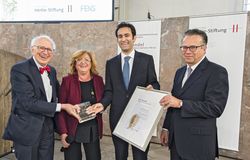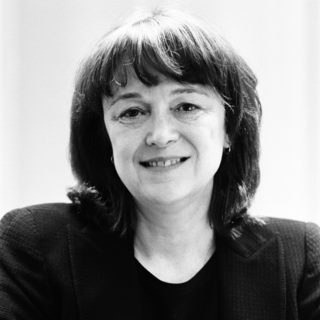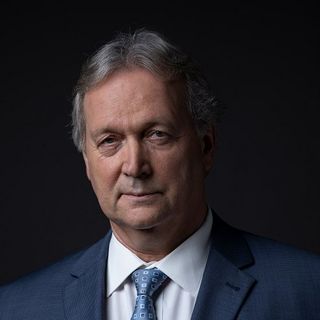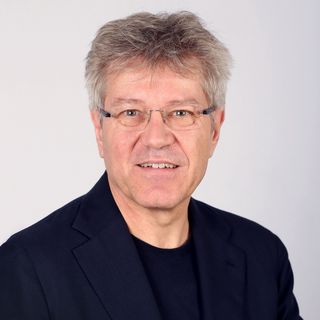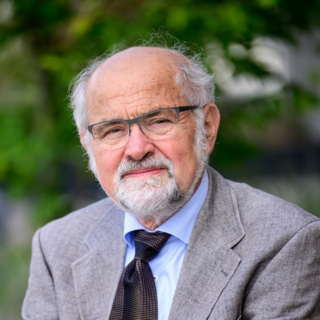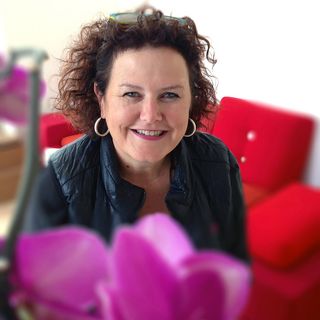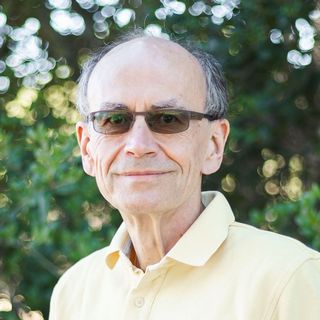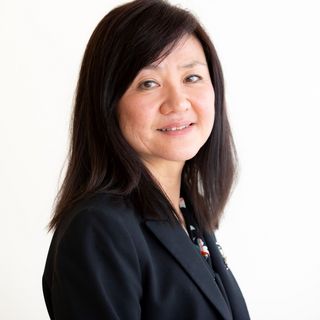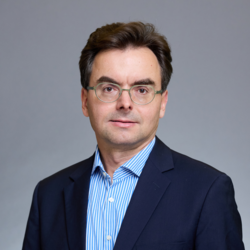The Eric Kandel Young Neuroscientists Prize recognises the work of outstanding young scientists in the field of neuroscience and helps advance their careers as researchers. The Eric Kandel Young Neuroscientists Prize, named after American neuroscientist and Nobel laureate Prof. Eric Kandel, was established in 2009 in order to recognise the work of outstanding young scientists in any field of neuroscience and to help advance their careers as researchers. The prize is awarded every two years by the Hertie Foundation in conjunction with FENS since 2010, being under the patronage of the german Ministry for Education and Research.
The Prize 2025
The Hertie Foundation in cooperation with the Federation of European Neuroscience Societies (FENS), is pleased to announce the opening of nominations for the Eric Kandel Young Neuroscientists Prize 2025.
The prize includes the Prize money of € 50,000 for personal use, a research funding of € 50,000 and the invitation to give the Eric Kandel Prize Lecture at the FENS Forum 2026 in Barcelona. All European neuroscientists under the age of 40, who have demonstrated outstanding and independent scientific creativity and productivity, as documented by multiple and excellent publications in leading scientific journals, are eligible. The age limit may be extended for specific circumstances such as maternity and paternity leave (max. 2 years per child).
Candidates must be nominated by the head of their university/research institute or by an internationally renowned neuroscientist. Self-nomination is not possible. Nominations must include the following documentation: 1) a letter of recommendation (not exceeding two pages), 2) the candidate’s curriculum vitae including, 3) a publication list, 4) three key publications in PDF format with at least one independent publication from the candidate’s lab.
The deadline for nominations is July 24, 2025. Nominations must be submitted by E-Mail to the Hertie Foundation to Prof. Alexander Grychtolik (Grychtolikaf@ghst.de). An international jury of leading neuroscientists will select the candidate. The winner will be officially announced in autumn 2025 under www.fens.org with the publication of the congress program for the FENS Forum 2026. The prize will be awarded on 7 July 2026 at the FENS Forum in Barcelona during the Eric Kandel Prize Lecture.
Announcement Eric Kandel Prize 2025
The deadline for nominations is July 24, 2025. An international jury of leading neuroscientists will select the candidate. The winner will be officially announced in autumn 2025 under www.fens.org with the publication of the congress program for the FENS Forum 2026. The prize will be awarded at the FENS Forum 2026 in Barcelona.
Awardees
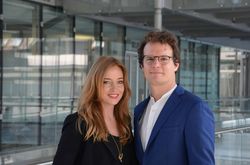
Prof. Dr. Mackenzie W. Mathis and Prof. Dr. Alexander Mathis receive the EUR 100,000 award for their scientific achievement in the field of computational behavioural neuroscience. They are assistant professors at the Brain Mind Institute, School of Life Sciences (École Polytechnique Fédérale de Lausanne), where they run their research groups. The focus of their collective work is uncovering the theoretical and neural basis of mechanisms underlying adaptive behaviour in intelligent systems. Among other things, they developed the first animal pose estimation computer vision tool that requires little user input data, called DeepLabCut. This tool is regarded as a breakthrough in life sciences and is used in over 1,000 leading companies, Institutes and Universities around the world. The official award ceremony of the Eric Kandel Young Neuroscientist Prize 2023 to Mackenzie Mathis and Alexander Mathis took place on 28 June 2024 during the Eric Kandel Prize Lecture at the FENS Forum in Vienna.
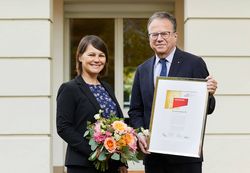
Prof. Dr. Julijana Gjorgjieva, born in 1983 in Macedonia, studied mathematics at Harvey Mudd College, California. In 2011, she completed her PhD in applied mathematics at the University of Cambridge (UK) and subsequently spent five years as a post-doctoral researcher at Harvard University and Brandeis University in the USA, with fellowships from the Swartz Foundation and the Burroughs-Wellcome Fund. In 2016, she established an independent research group at the Max Planck Institute for Brain Research in Frankfurt a. M. and was appointed Assistant Professor at TUM shortly afterwards through the MaxPlanck@TUM programme. Prof. Gjorgjieva is a member of the Bernstein Center for Computational Neuroscience Munich.
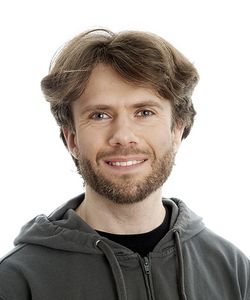
Misha B. Ahrens, PhD, born in The Netherlands in 1981, studied mathematics and physics at Cambridge University. He did a PhD in computational neuroscience at the Gatsby Computational Neuroscience Unit, University College London, in the group of Prof. Maneesh Sahani and Prof. Jennifer Linden. He then worked as a Sir Henry Wellcome Postdoctoral Fellow at Harvard University in the lab of Prof. Florian Englert. In 2012 he moved to Janelia Research Campus of the Howard Hughes Medical Institute to start his own lab. His lab works on understanding how behavior arises from information processing in distributed brain circuits, neuromodulatory systems, and glial cells of the zebrafish. His scientific work has been supported by the Wellcome Trust and the Howard Hughes Medical Institute et al. and has been awarded by The Simons Collaboration on the Global Brain.
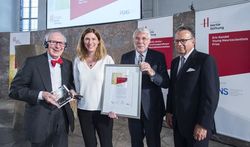
The Eric Kandel Young Neuroscientists Prize was announced in summer 2016 together with FENS for the fifth time. In spring 2017 an international panel of judges, including three Nobel laureates, selected Marta Zlatic, Ph.D. (Howard Hughes Medical Institute/University of Cambridge). During the internationalen Brain Awareness Week (13.-19. March 2017) she was announced as the laureate of the year 2017.
Marta Zlatic, born 1977 in Zagreb, studied neurosciences and chemistry at the Trinity College of the Chambridge University. She made her Ph.D. in 2004 in neurobiology at the Department for Zoology. Afterwards she worked as a Junior Research Fellow at the Trinity College and in 2009 she became a research group leader at the Howard Hughes Medical Institute (HHMI), Janelia Research Campus (USA). Since 2015 Marta Zlatic is also Lecturer for Neurosciences at the Department for Zoology, University of Cambridge, where she became a Trinity College Fellow in 2016. For her Ph.D. Thesis she received in 2005 the Thomas Henry Huxley Award by the Society for Zoology of the City of London. She also received a Wellcome Trust Prize Fellowship.
The Eric Kandel Prize is for Marta Zlatic´s contribution to the understanding of the neural mechanisms underlying decision-making in the brains of animals. Together with her research group, she discovered circuit mechanisms of competitive interactions between neurons in the nervous system of Drosophila larvae, which promote certain behaviours and suppress others. She also discovered processes that the nervous system uses to combine various sensory inputs in order to learn lessons for future decision-making. The outstanding feature of Marta Zlatic’s work was the combination of a number of different cutting-edge methods. The brain of the fruit fly larva is less complex than mammal brains, which makes it easier to map. Since basic neural processes in the brains of insects and humans are similar, her studies pave the way for further research on the human brain.
The Eric Kandel Prize 2017 was presented to Marta Zlatic during an official ceremony on 6 June 2017 at the St. Paul’s Church in Frankfurt am Main by Prof. Eric Kandel, the neuroscientist and Nobel Prize winner, Prof. Barry Everitt, the President of the Federation of European Neuroscience Societies, and Dr Frank-J. Weise, Chairman of the Hertie Foundation.
The Eric Kandel Young Neuroscientists Prize was announced in summer 2014 together with FENS for the fourth time. In spring 2015 an international panel of judges, including three Nobel laureates, selected Prof. Dr. Yasser Roudi as the 2015 winner.
Prof. Dr. Yasser Roudi was born in 1981. He studied physics at the Scharif University in Teheran and completed a PhD at the SISSA in Trieste, Italy. After a research stay at the University College London and at the Nordic Institute for Theoretical Physics in Stockholm he became assistant professor at the Kavli Institute, University of Trondheim. Since 2014 he holds a chair for theoretical neurosciences there.
With the help of methods from statistical physics, he has made significant contributions to the understanding of information processing in neuronal networks. Among these contributions is his work in collaboration with Nobel Prize winners Edvard and May-Britt Moser which has lead to the understanding of the network connectivity and mechanisms underlying grid cell formation.
Prof. Roudi is laureate of of numerous scientific prizes. He received e. g. the Nansen Prize four young scientists by the Norwegian Academy of Science (2014) and in the 2013 the Royal Norwegian Society of Sciences and Letters awarded him the prize for young scietists.
The Eric Kandel Young Neuroscientists Prize 2015 was presented to Prof. Roudi during an official ceremony on 28 May 2015 in St. Paul’s Church in Frankfurt am Main by Prof. Eric Kandel, the neuroscientist and Nobel Prize winner, Prof. Monica Di Luca, the President of the Federation of European Neuroscience Societies, and Dr. Frank-J. Weise, Chairman of the Hertie Foundation. The presentation of the Hertie Senior Research Professorship in Neuroscience 2015 was presented at the same event together with a panel discussion between Eric Kandel and the current Nobel laureates, May-Britt and Edvard Moser, about the role of prizes in sciences.
Following the awards there was a second panel discussion on “the brain at the couch – the psychoanalysis on the way into the neurosciences”, involving Prof. Eric Kandel and Prof. Mark Solms, psychoanalyst and neuroscientist. The discussion was moderated by Felicitas von Lovenberg (Feuilleton/Literature, Frankfurter Allgemeine Zeitung).
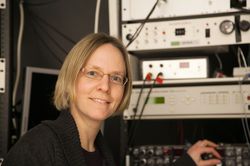
Prof. Dr. Sonja Hofer was born in Munich in 1977. She studied biology at the Technical University of Munich and completed a PhD in 2006 at the Max Planck Institute of Neurobiology in Martinsried (Germany). In 2011 she set up her own research group at University College London and has been an assistant professor at the Biozentrum of the University of Basel since 2013. She studies the development and detailed organisation of the visual system, particularly the way in which sensory information is processed and stored in the neuronal networks of the cerebrum. Through her research, she has discovered fundamental principles governing the ways in which nerve cells are connected in local networks, and was able to demonstrate that structural changes in cerebral networks can be used for long-term storage of information.
She has received a number of prizes for her scientific research, including the Otto Hahn Medal awarded by the Max Planck Society, and the Wellcome Beit Prize awarded by the Wellcome Trust.
The Eric Kandel Young Neuroscientists Prize 2013 was presented to Prof. Dr. Hofer during an official ceremony on 27 September 2013 in St. Paul’s Church in Frankfurt am Main by Prof. Eric Kandel, the neuroscientist and Nobel Prize winner, Prof. Marian Joëls, the President of the Federation of European Neuroscience Societies, and Dr. John Feldmann, Chairman of the Hertie Foundation. The presentation of the Hertie Senior Research Professorship in Neuroscience 2013 was presented at the same event.
Following the awards there was a panel discussion on “The creative human: Art and science in conversation”, involving Prof. Eric Kandel, Herlinde Koelbl, the art photographer and film maker, and painter Prof. Markus Lüpertz (the discussion was moderated by Gert Scobel, ZDF/3sat journalist).
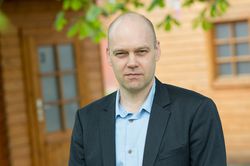
Prof. Dr. Henrik Mouritsen was born in Aalborg (Denmark) in 1971. He has been a professor at the University of Oldenburg (Germany) since 2007, where he is head of the Animal Navigation (Neurosensorik) research group.
Using a wide range of innovative and multidisciplinary techniques that had not previously been used in bird navigation research, Prof. Dr, Mouritsen and his international research group succeeded in identifying four areas of the brain that birds can use to perceive the Earth’s magnetic field in two different ways: two areas process light-related information from the eye, which the birds use to perceive the compass direction of the magnetic field visually. The other two areas are linked via nerve tracts to the upper part of the beak, where scientists suspect there is a magnetic sensor of iron-mineral-based crystalline structures. Prof. Dr. Mouritsen has already received numerous prizes and distinctions for his research, including a Lichtenberg Professorship from the VW Foundation in 2006.
The Eric Kandel Young Neuroscientists Prize 2011 was presented to Prof. Dr. Mouritsen during an official ceremony on 1 June 2011 in St. Paul’s Church in Frankfurt am Main, alongside the Hertie Senior Research Professorship in Neuroscience 2011, in the presence of the Mayor of Frankfurt am Main, Ms Petra Roth. Three Nobel Prize winners for medicine took part in a panel discussion with Gert Scobel (ZDF/3sat journalist) on “An ideal world? How scientists see the future”.
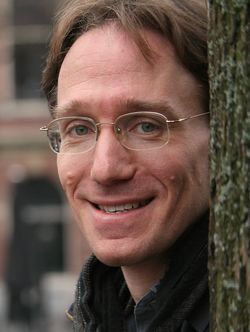
Dr. Simon E. Fisher, born 1970, conducts research at Oxford University (Wellcome Trust Centre for Human Genetics) and has been head of the Molecular Neuroscience group there since 2002. He has been Director of the new Language and Genetics Department at the Max Planck Institute for Psycholinguistics in Nijmegen (Netherlands) since October 2010. His research focuses on the influence of genes involved in the development of speech and language skills. In 1998, while studying a family affected by speech disorders (articulation disorders), Dr. Fisher and Anthony Monaco discovered a segment on chromosome 7 that they were able to relate to the family’s distinctive speech traits. By researching the genes of this family and of an unrelated boy displaying the same symptoms, the researchers were able to identify the “language gene” FOXP2 for the first time. Dr. Fisher has received numerous academic prizes and distinctions for his research work, and gave the Francis Crick Lecture at the Royal Society in London in 2008.
The Eric Kandel Young Neuroscientists Prize was presented to Dr. Fisher during an official ceremony at the University of Zurich on 6 October 2009.
Jury 2025
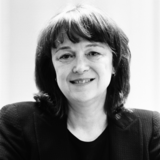
Prof. Dr. Linda Buck
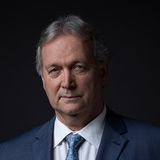
Prof. Dr. Tamás Freund
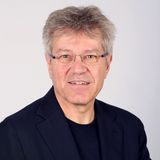
Prof. Dr. Ole Kiehn

Prof. John H. Morrison, PhD
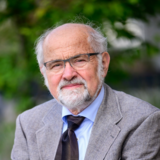
Prof. Dr. Erwin Neher
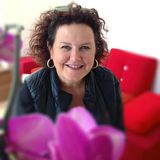
Prof. Dr. Erin Schuman

Prof. Dr. Thomas C. Südhof




